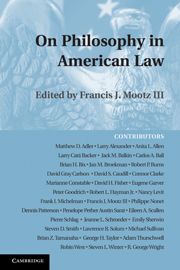Book contents
- Frontmatter
- Contents
- Introduction
- PART I KARL LLEWELLYN AND THE COURSE OF PHILOSOPHY IN AMERICAN LAW
- PART II PHILOSOPHICAL PERSPECTIVES ON LAW
- PART III AREAS OF PHILOSOPHY AND THEIR RELATIONSHIP TO LAW
- PART IV PHILOSOPHICAL EXAMINATIONS OF LEGAL ISSUES
- PART V LAW, RHETORIC, AND PRACTICE THEORY
- 23 Foundationalism and Ground Truth in American Legal Philosophy: Classical Rhetoric, Realism, and Pragmatism
- 24 The Irrelevance of Contemporary Academic Philosophy for Law: Recovering the Rhetorical Tradition
- 25 Dicta
- 26 Recent and Future Concepts of Law: From Conceptual Analysis to a Practice Theory of Law
- 27 The Tasks of a Philosophy of Law
- PART VI QUESTIONING THE RELATIONSHIP BETWEEN PHILOSOPHY AND AMERICAN LAW
- PART VII COMMENTARIES
- Contributors and Selected Bibliography
- Name Index
- References
24 - The Irrelevance of Contemporary Academic Philosophy for Law: Recovering the Rhetorical Tradition
Published online by Cambridge University Press: 31 July 2009
- Frontmatter
- Contents
- Introduction
- PART I KARL LLEWELLYN AND THE COURSE OF PHILOSOPHY IN AMERICAN LAW
- PART II PHILOSOPHICAL PERSPECTIVES ON LAW
- PART III AREAS OF PHILOSOPHY AND THEIR RELATIONSHIP TO LAW
- PART IV PHILOSOPHICAL EXAMINATIONS OF LEGAL ISSUES
- PART V LAW, RHETORIC, AND PRACTICE THEORY
- 23 Foundationalism and Ground Truth in American Legal Philosophy: Classical Rhetoric, Realism, and Pragmatism
- 24 The Irrelevance of Contemporary Academic Philosophy for Law: Recovering the Rhetorical Tradition
- 25 Dicta
- 26 Recent and Future Concepts of Law: From Conceptual Analysis to a Practice Theory of Law
- 27 The Tasks of a Philosophy of Law
- PART VI QUESTIONING THE RELATIONSHIP BETWEEN PHILOSOPHY AND AMERICAN LAW
- PART VII COMMENTARIES
- Contributors and Selected Bibliography
- Name Index
- References
Summary
Can we hope for justice in this world? Plato thought not. In the Republic, he suggests that justice can be achieved only if the philosophers rule, but also that philosophers cannot simultaneously rule the many and remain in the sunlight of true knowledge. They must return to the cave. Leo Strauss famously interprets Plato as arguing that the philosopher in the cave must speak esoterically because if he speaks plainly his wisdom will be misunderstood, leading the prisoners to attack the one who opens this dangerous line of thinking. After all, the philosopher “returning from divine contemplations to the petty miseries of men cuts a sorry figure and appears most ridiculous, if, while still blinking through the gloom, and before he has become sufficiently accustomed to the environing darkness, he is compelled in courtrooms or elsewhere to contend about the shadows of justice” (Plato 1930: 517d–517e). What, then, can be said about striving to create a just world? Plato leaves us with the Laws, in which three tradition-bound men discuss politics in light of real-world practical constraints. Law is our resignation in the face of the impossible demands of justice; it is not just unphilosophical; it is antiphilosophical.
Against this backdrop, is it realistic to believe that today's philosophers will provide our divided world with the roadmap to just social relations? Can philosophy reveal that we are living in the shadows and shed light on our imprisoned predicament?
- Type
- Chapter
- Information
- On Philosophy in American Law , pp. 205 - 214Publisher: Cambridge University PressPrint publication year: 2009
References
- 1
- Cited by



